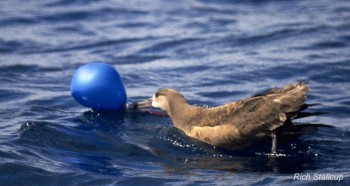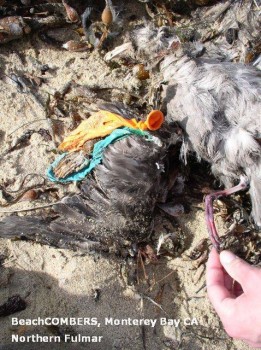Many seabird species, including ACAP-listed albatrosses and petrels, are well known to mistake floating plastic artefacts at sea as food items and ingest them. These items may then be regurgitated to their chicks causing injury and mortalities, with North Pacific albatrosses being particularly at risk, as are several species of shearwaters. Less well known is that discarded plastic items can lead to seabirds becoming entangled, often with fatal consequences.
Recently, a Black-footed Albatross Phoebastria nigripes found entangled in balloons and string was found by Beach COMBER (Coastal Ocean Mammal & Bird Education and Research Surveys) volunteers during a monthly beach survey at Zmudowski State Beach in Monterey County, California, USA. In addition, a Northern or Arctic Fulmar Fulmarus glacialis was found during a beach survey in the Monterey Bay National Marine Sanctuary entangled around the wing with balloons and string. Over 30 Mylar and latex balloons were reported scattered on beach surveys last month in the Monterey Bay National Marine Sanctuary.



Calls (click here) are now being made to halt the celebratory mass release of helium-filled balloons at outdoor events as an unnecessary source of pollution – that affects turtles (that mistake them for jellyfish) and other marine species as well as seabirds.
“So you let a balloon go……where will it go from here? You will probably watch the balloon until it floats out of sight. But many may not realize that what goes up must come down. And come down they do, as litter on our planet. The balloon will continue to climb in elevation until the atmospheric pressure will cause most to pop and some to slowly deflate and float down to Earth; but all will then descend to Earth where some will fall on land while most will fall in the vast ocean.”
John Cooper, ACAP Information Officer, 15 July 2013

 English
English  Français
Français  Español
Español